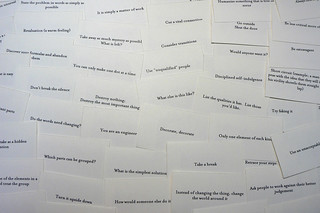- Oblique Strategies List
- Oblique Strategies List
- Oblique Strategies List Complete
- Oblique Strategies List Complete
- Tactics Tutorial. There are Seven Classical Maneuvers of War: penetration of the center, envelopment of a single flank, envelopment of both flanks, attack in oblique order, feigned retreat, attack from a defensive position and the indirect approach. A commander often must employ more than one maneuver to achieve victory; he may try to penetrate.
- Oblique Strategies cards sound like they would be useful for certain artistic domains. When I was taking creative writing and storytelling classes, I had a lot of trouble generating story ideas. I used similar randomizer aids (as writing prompts) to see latent possibilities.
Oblique Strategies was a set of 7-by-9-centimetre (2.8 in × 3.5 in) 100 printed cards, created by Brian Eno and Peter Schmidt in 1975, as a way of assisting creative problem solving. If you're a little stuck, you'd draw a card, and see if it somehow gives you an idea for how to move forward. It is an aid for lateral thinking. Providing a somewhat off-the-wall suggestion which makes you maybe see things from a different angle. There are many possible ways of provoking lateral thinking, like the old trick of looking up one or two random words in the dictionary.
A line has two sides
Originally created in 1975 by musician Brian Eno and painter Peter Schmidt, Oblique Strategies began as a box of index-sized cards for artists, made of cut up, discarded prints from Schmidt’s studio. Now, in 2016, the cards can arrive on your phone. I found them by following the breadcrumbs from a story in the New Yorker magazine describing a.
A very small object. Its center
Abandon desire
Abandon normal instructions
Accept advice
Adding on
Always give yourself credit for having more than personality
Ask people to work against their better judgement
Ask your body
Balance the consistency principle with the inconsistency principle
Be dirty
Be extravagant
Breathe more deeply
Bridges -- build -- burn
Cascades
Change ambiguities to specifics
Change instrument roles
Change nothing and continue consistently
Children -- speaking -- singing
Cluster analysis
Consider different fading systems
Consult other sources -- promising -- unpromising
Convert a melodic element into a rhythmic element
Courage!

Cut a vital connection
Decorate, decorate
Destroy nothing; Destroy the most important thing

Discard an axiom
Disciplined self-indulgence
Discover your formulas and abandon them
Display your talent
Distort time
Do nothing for as long as possible
Do something boring
Do something sudden, destructive and unpredictable
Do the last thing first
Do the washing up
Do the words need changing?
Do we need holes?
Don't avoid what is easy
Emphasize differences
Emphasize repetitions
Emphasize the flaws
Feed the recording back out of the medium
Fill every beat with something
Find a safe part and use it as an anchor
Get your neck massaged
Ghost echoes
Give the name away
Give way to your worst impulse
Go outside. Shut the door.
Go slowly all the way round the outside
How would you have done it?
Idiot glee
Imagine the piece as a set of disconnected events
Infinitesimal gradations
Intentions -- nobility of -- humility of -- credibility of
Into the impossible
Is it finished?
Is something missing?
Is the intonation correct?
It is quite possible (after all)
Just carry on
Left channel,right channel, center channel
Listen to the quiet voice
Look at the order in which you do things
Lost in useless territory
Lowest common denominator
Magnify the most difficult details
Make a blank valuable by putting it in an exquisite frame
Make what's perfect more human
Mechanize something idiosyncratic
Mute and continue
Only one element of each kind
Openly resist change
(Organic) machinery
Put in earplugs
Reevaluation (a warm feeling)
Remember quiet evenings
Remove a restriction

Repetition is a form of change
Reverse
Short circuit (example: a man eating peas with the idea that they will improve his virility shovels them straight into his lap)
Simple subtraction
Spectrum analysis
Take a break
Take away the important parts
Tape your mouth
The inconsistency principle
The tape is now the music'
Think of the radio
Tidy up
Trust in the you of now
Turn it upside down
Twist the spine
Use an old idea
Use an unacceptable color
Use fewer notes
Use filters
Use your own ideas
Water
What are the sections sections of? Imagine a caterpillar moving
What are you really thinking about just now?
What is the reality of the situation?
What mistakes did you make last time?
What would your closest friend do?
Work at a different speed
You are an engineer
You can only make one dot at a time
Your mistake was a hidden intention
Don't break the silence
Don't stress one thing more than another
Use 'unqualified' people
What wouldn't you do?
Try faking it [Stewart Brand]
Slow preparation, fast execution
Is the style right?
Where is the edge?
Voice your suspicions
What is the simplest solution?

Make it more sensual
Use something nearby as a model
Oblique Strategies List
Think -- inside the work -- outside the work
What context would look right?
When is it for?
What to increase? What to reduce? What to maintain?
Oblique Strategies List
How would someone else do it?
Would anyone want it?
Go to an extreme, come part way back
Once the search has begun, something will be found
Be less critical
From nothing to more than nothing
Retrace your steps
Only a part, not the whole
Faced with a choice, do both [Dieter Rot]
Always give yourself credit for having more than personality [Arto Lindsay]
Revaluation (a warm feeling)
Lost in useless territory
It is quite possible (after all)
Idiot glee
Move towards the unimportant
It is simply a matter of work
Not building a wall; making a brick
The most easily forgotten thing is the most important
State the problem as clearly as possible
Always the first steps
Question the heroic
Go outside. Shut the door.
In total darkness, or in a very large room, very quietly
Which parts can be grouped?
Change specifics to ambiguities
Oblique Strategies List Complete
Use cliches
Consider transitions
Online list:
Oblique Strategies List Complete
Sadly, we are not BFF’s with Peter Norton or included on his holiday mailing list of friends who received the annual art projects commissioned over the last few decades. The Norton’s 1996 offering was created by the British musician Brian Eno and we are fortunate to have acquired a copy.
Eno and his friend, artist Peter Schmidt (who passed away in 1980), enjoyed playing the card game of Oblique Strategies. In 1975, the two wrote their own edition focusing on the art world. In this game of strategies, each card presents us with a problem we might face in life, along with a suggested way to approach the problem creatively.
In 1996, Eno revised and rewrote the deck of one hundred cards, which were edited by Norton and translated into Mandarin, Hindi, Spanish, Russian, and Arabic.
Brian Eno and Peter Schmidt, Oblique Strategies. One Hundred Worthwhile Dilemmas, 1996. Graphic Arts Collection 2013- in process.
“These cards evolved from our separate working procedures. It was one of the many cases during the friendship that he [Peter Schmidt] and I where we arrived at a working position at almost exactly the same time and almost in exactly the same words. There were times when we hadn’t seen each other for a few months at a time sometimes, and upon remeeting or exchanging letters, we would find that we were in the same intellectual position – which was quite different from the one we’d been in prior to that.
-Brian Eno, interview with Charles Amirkhanian, KPFA-FM Berkeley, 2/1/80
See also Peter Schmidt’s design for Eno’s CD, Before and After Science (2004). Mendel Music Library (MUS) CD- 24728